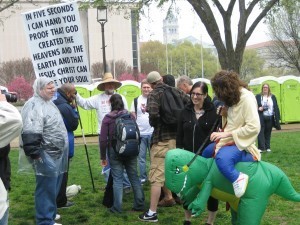Good > Without God

Left: Christian protester. Right: Man dressed as Jesus riding a dinosaur. This is what most college students do on the weekend, right?
After two trains, a bus, a quick breakfast with my fellow NPS panelist Walker Bristol and our Unelectables co-blogger Chelsey Faloona, and two more trains, I stumbled up the Metro stairs and onto the National Mall in the midst of the Reason Rally. All my exhaustion and scrunched-bus-napping-induced aches were replaced with the excitement of finally being there. This was the largest gathering of atheists, agnostics, Humanists, and other assorted non-religious folks in history. Around 20,000 of us flocked to the capital for a day of speeches, music, comedy, and celebration.
I have so far refrained from looking at any of the (from what I hear, extensive) news coverage of the event, because I would like to share my own impressions before they are colored by others. I think that media and popular responses to the event, from the religious and non-religious alike, will be crucial to determining whether it accomplished its goals – which were, according to the Reason Rally website, to dispel stereotypes about atheists, to encourage people to come out of the closet as non-believers or supporters thereof, and to achieve (or at least move toward) legislative equality. I will probably do another post in a few weeks, once the dust has had time to settle, on how well this seems to have worked. For now, here are my own impressions.
First of all, I am so proud that this event happened, and so glad that I was able to go (thanks to the generous funding of a donor from the Secular Massachusetts Meetup). I firmly believe that the non-religious do need to organize if we want to get anything done – and we have so much to do. I had a fantastic time last weekend, and I'm extremely grateful to everybody who put the rally together. It was a huge step for our movement.
But we still have a long way to go.
As I emerged from the Metro, yellow-shirted volunteers were ready to direct me to the rally. One of these volunteers was calling out to passersby as he directed them: "Atheists! Agnostics! This way! Step right up! Reason Rally, over here! Skeptics! Non-believers!" I smiled at him and thanked him for pointing me in the right direction (although I would like to think that I could have found my own way to the giant stage in the middle of the park). He kept on calling out: "Freethinkers! People with brains! This way!" My smile drooped as I walked away, thinking, oh, good, here we go again.
A lot of the day was focused on positive rhetoric, inspiring the crowds to work towards the three goals mentioned earlier. Don't be ashamed of who you are! Tell people what you believe! Be proud! Demand equal treatment! Defend your rights! Let's unite and work together towards our common goals! Build supportive communities! Show people that we can be good for goodness's sake!
That all sounds great. But I was shocked at the apparent lack of cognitive dissonance that many of the speakers (and attendees) experienced when these lovely sentiments were blatantly contradicted, often in the next breath.
I particularly remember Dave Silverman, the president of American Atheists, delivering a rousing fire-people-up kind of speech in which he instituted a "no more bigotry" rule. I love that rule. Within a matter of seconds, however, he was insulting religious people. No, not presenting a thoughtful critique of their beliefs. Flat-out insulting people. It was…oh, what's the word…bigotry. What happened to the "no more bigotry" rule? I asked this out loud, and several people around me immediately set me straight, telling me (most of them in a tone implying that this distinction should have been obvious to me) that the rule applied to anti-atheist bigotry only.
Oh.
…So, I know we all become flushed with passion at the thought of logic and reason and so on, but I'm having trouble following the argument for why we should demand respectful treatment from people who believe we are mistaken, but we feel no need to treat the people we believe are mistaken with equal respect. Wouldn't it be simpler to extend the "no more bigotry" rule to everybody?
Fortunately, Greta Christina was on hand to remind me why atheists are angry. This is a speech she has given many times before; you can see the video from Skepticon here. I actually kind of love this speech – mostly. I'm completely on board with about 95% of it. Religion has been responsible for some pretty fucked up stuff. (Just to be clear, I'm not claiming that religion is responsible for every bad thing, or even most of the bad things many atheists like to blame on it – for a great article on this bad habit, check out the Rogue Priest. But I'm comfortable attributing some pretty lousy things to religion.) I've said this before, but I would love for religion to go away. So don't tag me with that "belief in belief" crap.
Here's the difference between me and Christina. She wraps up her list of grievances with a defense of aggression. After all, we have reasons to be angry, so why should we hold back? But I think there is a small but crucial distinction between being angry and lashing out. Christina claimed at the rally that "nobody ever accomplished social change by being nice" (I might not have that quote exactly right, but that's as close as I can remember, and it definitely captures the sense of what she said). Again, I couldn't help responding out loud, to the indignation of those around me. "Um…Martin Luther King. And Mahatma Gandhi. And Harvey Milk." I didn't go on because I was getting dirty looks again. I'm not sure if people were glaring at me because they disagreed or because they didn't want to be reminded of pesky facts that didn't fit with their worldview. Which is one of the things people at the rally repeatedly mocked religious people for doing.
Sigh.
Christina's questionable claim about the ineffectuality of niceness was just part of an ongoing debate over tactics. According to most atheists, it would seem – or at least the loudest ones – this is the million-dollar question: Will we deconvert more religious people by being nice to them, or by teasing them and yelling at them?
I don't know the answer, although I do have my suspicions. But here's another question I think has been overlooked, and one which was stuck in my head throughout the rally and never answered: If we really are committed to being good for goodness's sake (which we love to brag that we are), then why do we spend so much time calculating whether it's strategic to treat people respectfully? Shouldn't we be respectful because that's the right thing to do, and we (supposedly) do the right thing simply because it's right?
I know we love tracing our non-believing heritage to famous dead guys, so let's take a leaf from David Hume's book: "Be a philosopher; but, amidst all your philosophy, be still a man."
Personally, the moments of the rally when I was most moved, inspired, and proud were those which focused more on our shared humanity and less on our theological disputes with our neighbors. The top three showings, for me, were by Jesse Galef, who gave an uplifting and rousing speech on the importance of community, particularly for young people; Senator Tom Harkin, who isn't even an atheist but beautifully explained why he, as a religious person, fully supports the secular movement and the rally; and of course the inimitable Eddie Izzard, who always manages to use humor in exactly the right way, brilliantly critiquing religion without punishing the people who cherish it. He doesn't hold back from poking holes right and left in theology, but he does it in such a way that religious people can laugh at it, too. And maybe it's just me, but I think showing people how to laugh at themselves might cause people to see their own worldview from a different perspective, whereas trying to tear it violently out of their hands will only make them clutch it more tightly. But even if it doesn't, I still think respect is worthwhile as more than just a strategy.
The Reason Rally was a hugely important event, and we should be proud of all that we've accomplished. But if we really want to show our religious neighbors that we can be good without god – or if we want to be able to look at ourselves without shame – we can't let the "without god" bit overshadow the (much more important, I think) part about just being good.
 Chelsea Link is a senior at Harvard University, studying History and Science with a focus in the history of medicine. She recently founded and currently writes for two other blogs, The Unelectables (following religious minority candidates in the 2012 election) and Blogging Biblically (documenting her attempt to read the Bible in a year). She is the Vice President of Outreach of the Harvard Secular Society, the former President of the Harvard College Interfaith Council, and a Volunteer Ambassador for the Be the Match bone marrow donor registry. She likes to cook while pretending she's on Top Chef (hasty breakfast? more like Quickfire Challenge!), adores word games of all kinds (and was once the President of the illustrious Harvard College Crossword Society), and tends to kill the mood at parties by unnecessarily reciting Shakespeare. Last summer, she interned at the Humanist Chaplaincy at Harvard. You can ask her what she's doing after graduation, but she'll give you a different answer every time.
Chelsea Link is a senior at Harvard University, studying History and Science with a focus in the history of medicine. She recently founded and currently writes for two other blogs, The Unelectables (following religious minority candidates in the 2012 election) and Blogging Biblically (documenting her attempt to read the Bible in a year). She is the Vice President of Outreach of the Harvard Secular Society, the former President of the Harvard College Interfaith Council, and a Volunteer Ambassador for the Be the Match bone marrow donor registry. She likes to cook while pretending she's on Top Chef (hasty breakfast? more like Quickfire Challenge!), adores word games of all kinds (and was once the President of the illustrious Harvard College Crossword Society), and tends to kill the mood at parties by unnecessarily reciting Shakespeare. Last summer, she interned at the Humanist Chaplaincy at Harvard. You can ask her what she's doing after graduation, but she'll give you a different answer every time.



